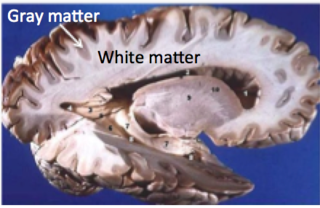I’m expecting all kinds of criticism for this test.
Some people will argue it’s overly simplistic. Others will assert it’s misleading–even dangerous—to suggest that you can assess intelligence –at least sort of–through a one second test.
So, I’m not actually going to present a test that gives a rough gauge of intelligence in just one second.
Rather, I’m going to offer a test that will give you an idea of your brain power in far less than a second; about a third of a second to be precise.
Here’s how the test works.
Shockingly, there does seem to be a mild correlation between simple reaction time (e.g. how fast you stomp on the brakes when a pedestrian darts in front of you) and how smart you are. Your level of general intelligence might depend on cognitive processing speed, which, in turn may arise from the heftiness of “white matter” (myelinated nerve fibers) in your brain. This photo shows white and gray matter in a typical brain. Notice how much of your brain is white matter!
Neurons whose cell bodies reside in the gray matter of your cerebral cortex, for instance, communicate with each other, and with deeper parts of the brain, via axons that are insulated with a fatty substance called myelin that speeds up neural conduction. (Myelin is the pale substance that makes white matter white). If axons of your cortical neurons (where intelligence is thought to reside) are better insulated than in an average brain (greater myelination permits faster conduction speed), then different parts of your brain might communicate faster than average, think faster than average and be smarter than average.
This could be the origin of phrases such as “She’s fast on the uptake,” or “He’s a little slow” when we are referring to someone’s smarts.
So, without further preamble here is the test.
Click on this link and follow the instructions for testing your reaction time.
A table in the link shows average reaction times, adjusted for age (reaction times tend to slow with age, especially after 60).
Very crudely, fast reaction times imply higher intelligence, slow reaction times lower intelligence, and average reaction times average intelligence.
For what its worth, my reaction time (321 milliseconds) was exactly average for my age group.
Sigh.
But I take comfort knowing that the correlation coefficient for reaction time and IQ is just .2, meaning that reaction time only accounts for 4% (.2 2) of the variation in intelligence.
Now here’s something weird to ponder.
Most likely your reaction time was in the neighborhood of 300 milliseconds. But recent research shows that a full 240milliseconds or more are needed for you to consciously perceive a visual stimulus such as the one presented in the test. Because there is insufficient time for neural impulses to travel from your brain to your muscles after you have sensed the stimulus, and for your muscles contract to click on the mouse (or trackpad or touchscreen), you must have started your mouse click well before you were consciously aware of the visual stimulus.
In other words, you reacted before you knew you were going to react.
This suggests that you must have predated your perception of the flashing visual stimulus to create the illusion that it occurred before, as opposed to after you reacted. Neuroscientist Dr. Benjamin Libet discovered that such “antedating” of consciousness, is, in fact, exactly what happens. He found, by measuring brain electrical signals associated with perception, consciousness and motion, that people routinely decide to move many milliseconds before they are aware of their decisions.
A fascinating question grows out of these findings: if your body reacts well before you consciously decide to react, who exactly is in charge of your body?
Hmmm….
**This article was originally published on Dr. Eric Haseltine’s Psychology Today Column**
© Dr. Eric Haseltine



